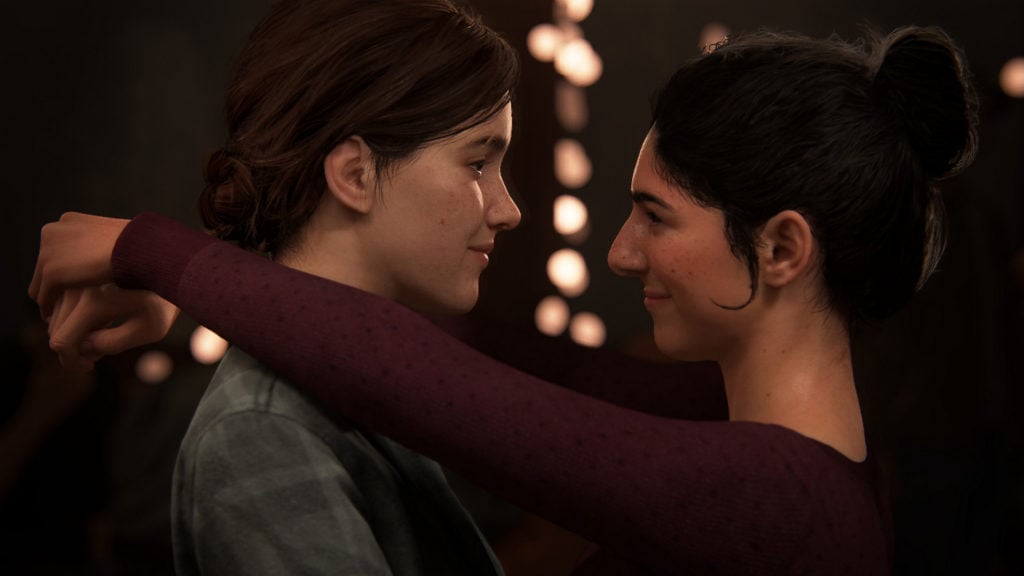
Ellie (Ashley Johnson), left, and her girlfriend, Dina (Shannon Woodward), are two prominent queer characters in the acclaimed blockbuster game “The Last of Us Part II.” Approximately 17% of active video game players are LGBTQ+, but less than 2% of games on major consoles and personal computers include queer characters, according to a report from GLAAD. (Photo: Naughty Dog)
Approximately 17% of active video game players are LGBTQ+, but less than 2% of games on major consoles and personal computers include queer characters, according to a report from GLAAD.
Also, online harassment of queer gamers, or gaymers, is far too common, the report says.
“The findings of this report send a powerful message to the industry: it is time to move past the idea that LGBTQ-inclusive games are a separate, niche category,” Blair Durkee, GLAAD’s associate director of gaming, says. “All games should strive to reflect the people who play them. And when one in five gamers are LGBTQ, any game with five or more characters has no excuse for lacking LGBTQ inclusion.”
The watchdog group this week released its inaugural “State of LGBTQ Inclusion in Video Games,” developed by the GLAAD Media Institute in partnership with the Nielsen Games Team.
It’s designed “to educate the game industry on the current state of LGBTQ representation that exists, make a fact-based business case for LGBTQ inclusion, and provide a playbook for more authentic representation,” GLAAD says in a press release.
Approximately 17% of active video game players are LGBTQ+, but less than 2% of games on major consoles and personal computers include queer characters, based on publicly available tags and lists denoting inclusive content, GLAAD says.
The number of active LGBTQ+ players has increased 70% from 2020, when Nielsen Games did a survey.
The presence of LGBTQ+ characters in games is welcomed by the queer community, and the straight-cisgender audience won’t be turned off, the report says.
- Approximately ¾ of LGBTQ+ gamers said seeing characters with their gender identity or sexual orientation represented in a positive way makes them feel better about themselves
- 70% of non-LGBTQ+ gamers said queer representation would either make them more likely to play or buy the game or wouldn’t affect their decision one way or another.
- 80% of LGBTQ+ gamers and 67% of non-LGBTQ+ gamers said they appreciate how gaming allows them to experience perspectives of people different from themselves.
- 65% of LGBTQ+ gamers said developers have a responsibility to make games and gaming spaces more inclusive.
- More than 50% said they are more likely to play or buy a game if they know its maker has a significant proportion of LGBTQ+ workers
- 69% are less likely to participate in a game from a company that has a history of mistreating queer employees.
- Approximately 50% of straight and cisgender respondents said the same on both counts.
LGBTQ+ players are significantly less likely to feel welcomed in the gaming community than their straight, cis counterparts.
- 38% of queer gamers sometimes feel like they don’t belong, compared to 24% of non-LGBTQ+ ones.
- 52% of LGBTQ+ gamers said they’ve been harassed while playing online, compared to 38% of straight, cisgender players.
But gaming provides an important social outlet for LGBTQ+ participants.
- 50% said they feel more welcomed in the gaming world than in the area where they live
- 55% of LGBTQ+ gamers who live in states that have proposed or passed anti-LGBTQ+ legislation feel more welcomed in the gaming world than in the area where they live
“Particularly for LGBTQ gamers, gaming is not only an escape and source of entertainment, but also an important outlet of self-expression,” GLAAD president and CEO Sarah Kate Ellis says in the press release. “It is past time for LGBTQ gamers to see our community represented in games that they play and to be safe while they connect with other gamers and express themselves.
“This report presents a clear business case for the industry to take action and address the needs of a rapidly growing portion of gamers,” she says. “The message is clear: gamers want more inclusive LGBTQ representation in their games and the industry must become more inclusive.”
